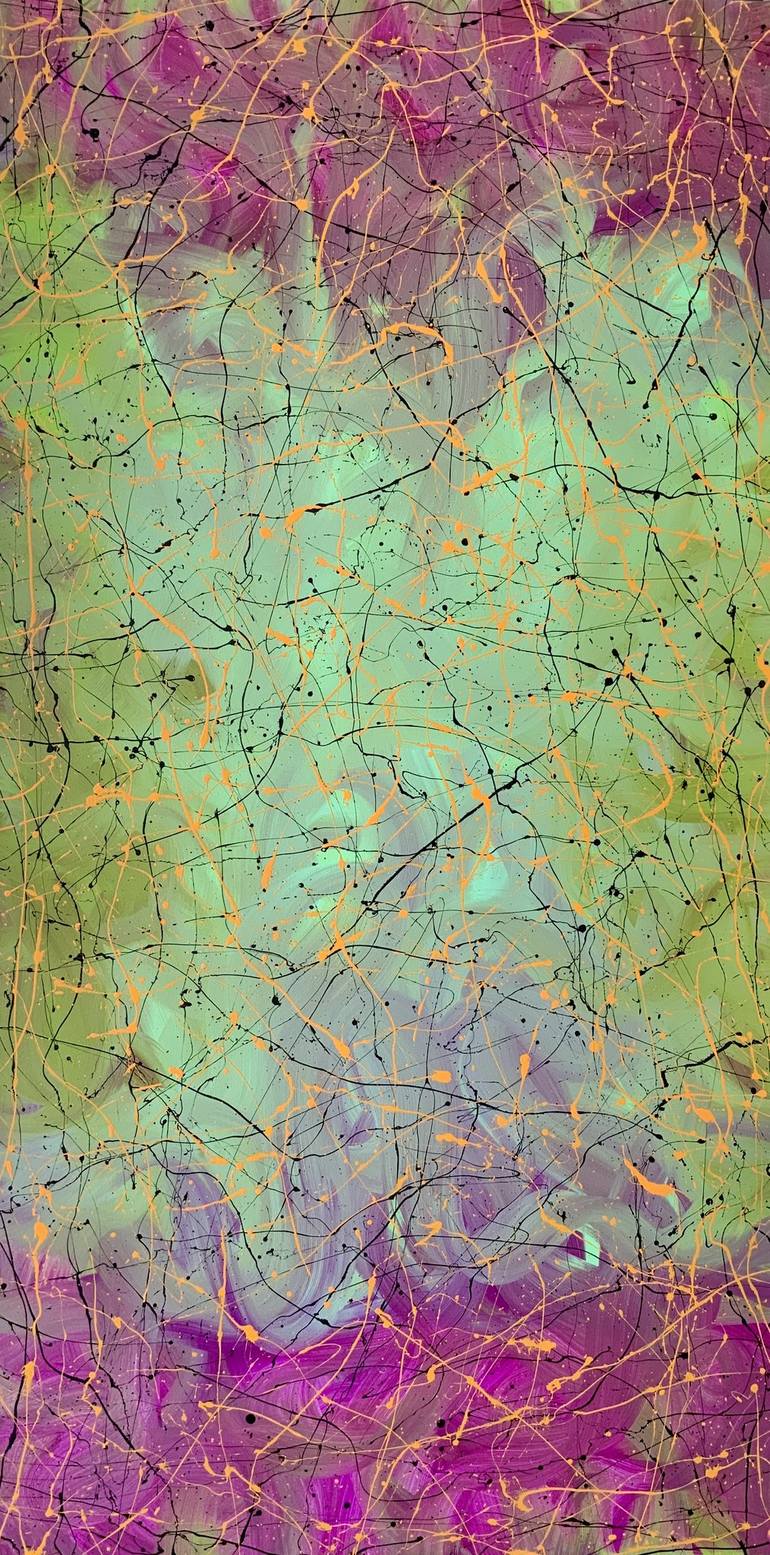







VIEW IN MY ROOM
Rapture Painting
Painting, Acrylic on Canvas
Size: 40 W x 80 H x 1.5 D in
Ships in a Crate
Shipping included
14-day satisfaction guarantee
Artist Recognition

Artist featured in a collection
About The Artwork
Toe to toe Dancing very close Barely breathing Almost comatose Wall to wall People hypnotized And they're stepping lightly Hang each night in rapture Back to back Sacroiliac Spineless movement and a wild attack Face to face Sadly solitude And it's finger popping Twenty-four hour shopping in rapture Fab Five Freddie told me everybody's fly DJ's spinnin' are savin' my mind Flash is fast Flash is cool Francois sais pas, flashé no do And you don't stop Sure shot Go out to the parking lot And you get in your car and drive real far And you drive all night and then you see a light And it comes right down and lands on the ground And out comes a man from Mars And you try to run but he's got a gun And he shoots you dead and he eats your head And then you're in the man from Mars You go out at night eatin' cars You eat Cadillacs, Lincolns too Mercurys and Subarus And you don't stop, you keep on eatin' cars Then when there's no more cars You go out at night and eat up bars Where the people meet Face to face Dance cheek to cheek One to one Man to man Dance toe to toe Don't move too slow 'Cause the man from Mars is through with cars He's eatin' bars, yeah, wall to wall Door to door ‘Rapture’ by Blondie Songwriter: Debbie Harry The rapture is an eschatological concept held by some Christians, particularly within branches of American evangelicalism, consisting of an end-time event when all Christian believers who are alive, along with resurrected believers, will rise "in the clouds, to meet the Lord in the air." The idea of a rapture is not found in historic Christianity, but is a relatively recent doctrine of Evangelical Protestantism. Source: Wikipedia
Details & Dimensions
Painting:Acrylic on Canvas
Original:One-of-a-kind Artwork
Size:40 W x 80 H x 1.5 D in
Frame:Not Framed
Ready to Hang:Not applicable
Packaging:Ships in a Crate
Shipping & Returns
Delivery Time:Typically 5-7 business days for domestic shipments, 10-14 business days for international shipments.
Handling:Ships in a wooden crate for additional protection of heavy or oversized artworks. Crated works are subject to an $80 care and handling fee. Artists are responsible for packaging and adhering to Saatchi Art’s packaging guidelines.
Ships From:United States.
Have additional questions?
Please visit our help section or contact us.
I’m (I am?) a self-taught artist, originally from the north suburbs of Chicago (also known as John Hughes' America). Born in 1984, I started painting in 2017 and began to take it somewhat seriously in 2019. I currently reside in rural Montana and live a secluded life with my three dogs - Pebbles (a.k.a. Jaws, Brandy, Fang), Bam Bam (a.k.a. Scrat, Dinki-Di, Trash Panda, Dug), and Mystique (a.k.a. Lady), and five cats - Burglekutt (a.k.a. Ghostmouse Makah), Vohnkar! (a.k.a. Storm Shadow, Grogu), Falkor (a.k.a. Moro, The Mummy's Kryptonite, Wendigo, BFC), Nibbler (a.k.a. Cobblepot), and Meegosh (a.k.a. Lenny). Part of the preface to the 'Complete Works of Emily Dickinson helps sum me up as a person and an artist: "The verses of Emily Dickinson belong emphatically to what Emerson long since called ‘the Poetry of the Portfolio,’ something produced absolutely without the thought of publication, and solely by way of expression of the writer's own mind. Such verse must inevitably forfeit whatever advantage lies in the discipline of public criticism and the enforced conformity to accepted ways. On the other hand, it may often gain something through the habit of freedom and unconventional utterance of daring thoughts. In the case of the present author, there was no choice in the matter; she must write thus, or not at all. A recluse by temperament and habit, literally spending years without settling her foot beyond the doorstep, and many more years during which her walks were strictly limited to her father's grounds, she habitually concealed her mind, like her person, from all but a few friends; and it was with great difficulty that she was persuaded to print during her lifetime, three or four poems. Yet she wrote verses in great abundance; and though brought curiosity indifferent to all conventional rules, had yet a rigorous literary standard of her own, and often altered a word many times to suit an ear which had its own tenacious fastidiousness." -Thomas Wentworth Higginson "Not bad... you say this is your first lesson?" "Yes, but my father was an *art collector*, so…"
Artist Recognition

Artist featured by Saatchi Art in a collection
Thousands Of Five-Star Reviews
We deliver world-class customer service to all of our art buyers.
Global Selection
Explore an unparalleled artwork selection by artists from around the world.
Satisfaction Guaranteed
Our 14-day satisfaction guarantee allows you to buy with confidence.
Support An Artist With Every Purchase
We pay our artists more on every sale than other galleries.
Need More Help?